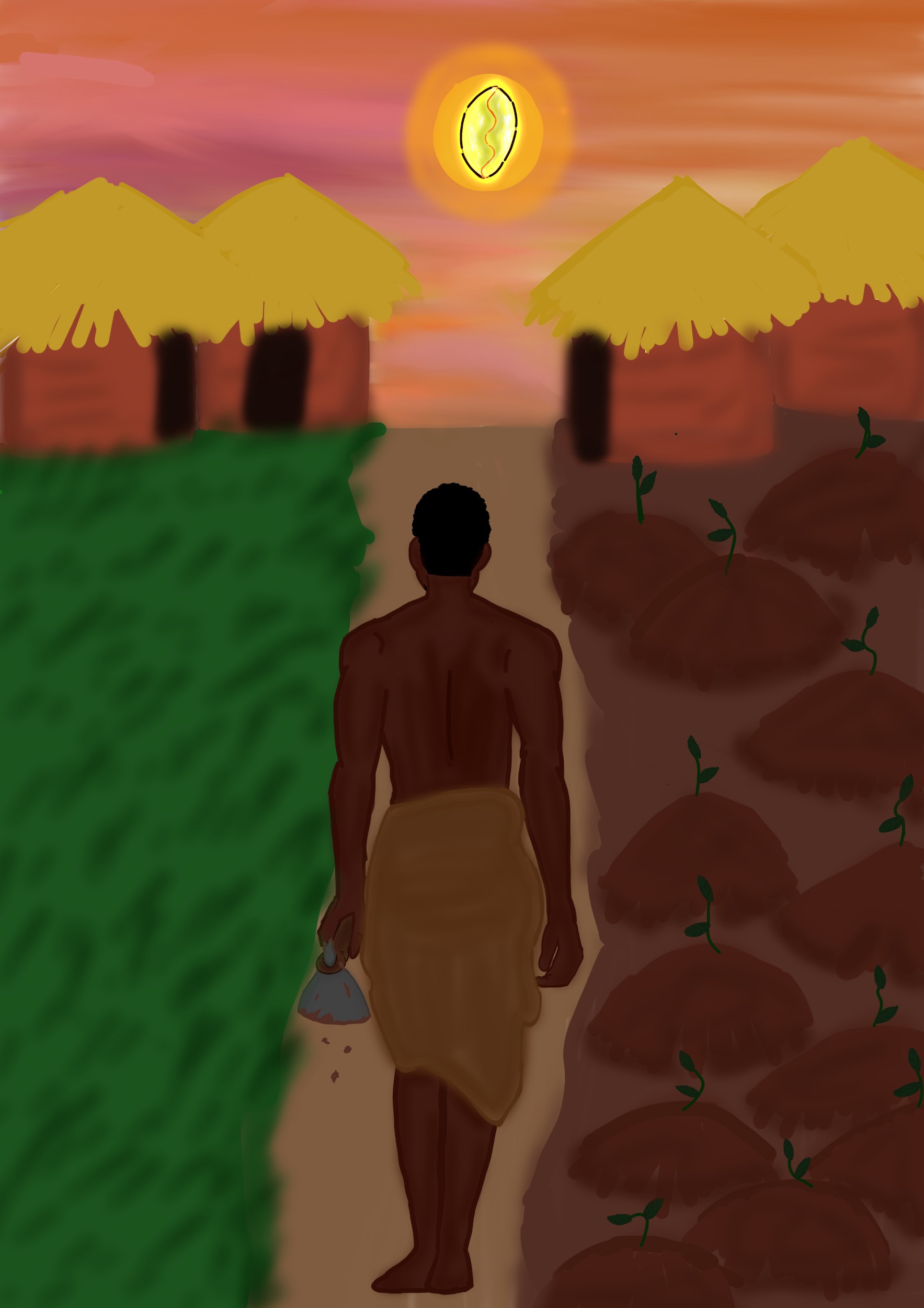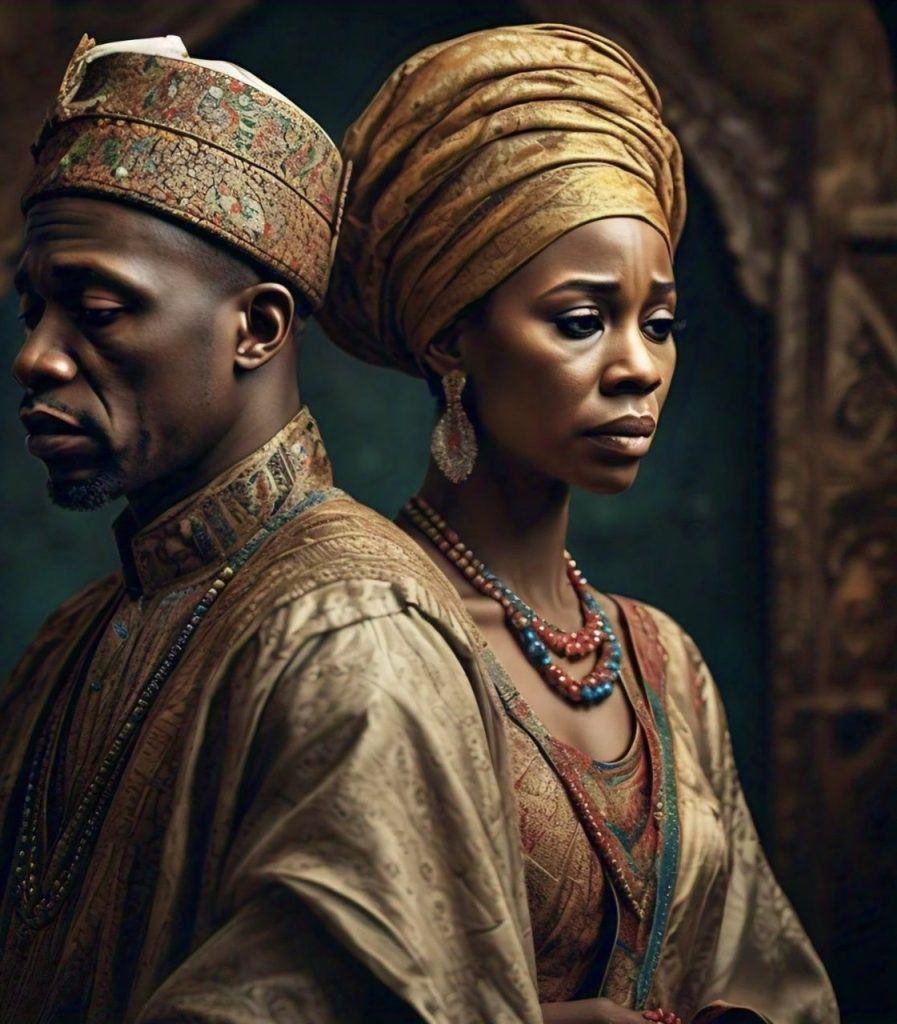CHAPTER ONE
One day, in the village of Gbobloshie, a hardworking farmer named Kwaku set out to inspect his fields, a daily ritual that gave him insight into the growth and health of his crops.
That morning, as he strolled, the air was rich with the scent of ripening cocoa pods and the earthy fragrance of the soil. At the rows of maise and yam, Kwaku beheld a peculiar sight—a leaf of such extraordinary beauty that it seemed to capture the very essence of the rainbow.
Unable to ignore this unusual plant, he went closer to investigate. It was a rare and beautiful leaf, its petals shimmering with the colours of the rainbow, reminding him of the ensuring promise and peace the rainbow represented. “This treasure only comes from the gods,” He said to him.
Kwaku’s heart was as fertile as the land he tended. He knew that beauty such as this was not meant to be hoarded but to be spread like the seeds he sowed each season. The decision to share the flower was as natural to him as drawing water from the well. So, he placed his basket on the earth and carefully began picking the flowers and placing them inside, his heart beating in admiration and curiosity. As he picked the flower, he observed its intricate patterns and how the light danced upon its petals. Each layer unravels a new colour pattern, from an outer playful deep red to an inner violet—the air, soft and fragrant.
Kwaku knew that this was no ordinary bloom; it was a symbol of the harmony that existed between man and nature, a reminder of the delicate balance that sustained life.
As the sun began to set, Kwaku made his way through the village with the intention of spreading this treasure from the gods. The paths were familiar, each etched with memories of barefoot childhood games and the laughter of friends. The houses, made of earth and love, stood as silent witnesses to the lives intertwined within this community.
Kwaku’s first stop was at Ama’s home. She was a widow known for her kindness and the wisdom that sparkled in her eyes. She welcomed him with a smile that spoke of years of resilience and grace. Kwaku presented the flower to her, its colours shining even brighter in the dimming light.
Ama’s eyes widened with wonder, and a soft gasp escaped her lips. She reached out, her fingers trembling slightly as they brushed against the petals. The flower seemed to acknowledge her touch, its colours pulsing gently. “This exceeds beautiful,” she whispered, unable to tear her eyes off the peculiar leaf.
Kwaku nodded, his decision reaffirmed by the joy he saw in Ama’s eyes. “It is a gift for all of us,” he said, ” a reminder that beauty and hope can bloom even in our darkest times.”
CHAPTER TWO
Word of Kwaku’s generosity spread through Gbobloshie as he continued his journey, sharing the flower with each household. At every door, faces lit up with delight, and the air was filled with exclamations of amazement. The flower’s beauty transcended age and circumstance, touching the hearts of the young and old alike.
At the house of Kojo, the blacksmith, the peculiar bud’s resilience was admired. “The hand of the gods must have been delicate when they forged this, ” Kojo observed. Careful handling the delicate bloom so as not to crush it with his mighty hands. His children watched in awe, learning a lesson in gentleness from their father.
The night approached, and the village square became a gathering place for those who had witnessed the flower’s beauty. Kwaku stood among his neighbours, his heart full as he watched the community come together. The flower had become more than a mere botanical wonder; it was a catalyst for connection, a spark that ignited a collective appreciation for the simple joys of life.
The elders of the village, with wisdom etched into the lines of their faces, spoke of omens and blessings. They saw the flower as a sign of prosperity and unity, a gift from the ancestors to remind the people of Gbobloshie of the strength of togetherness.
Having made a silent vow to share whatever he had, He understood now that the decision to share was not just about the act itself but about nurturing the bonds that held Gbobloshie together.
***
In the heart of Gbobloshie lived a woman named Yaa. Her home, a cosy structure of clay and thatch, had been silent for days, the usual hum of her vibrant presence replaced by a stillness that worried her neighbours.
Yaa, once the village’s beacon of laughter and wisdom, had been struck by an illness that left her bedridden, her once bright eyes now dimmed. Believing the flower was indeed a sight to behold, he walked to her house, his steps quickened by a mixture of concern and hope, for she was loved by all.
As he approached her door, he paused, admiring the flower’s radiant petals, which seemed to glow even brighter against the backdrop of the morning light. With a deep breath, he pushed the door open, the creak of the hinges announcing his arrival.
Inside, the air was heavy with the scent of herbs and the quiet murmur of prayers. The sight of Yaa lying on her bed – a shadow of herself frail and pale—tugged at Kwaku’s heart. He approached her bedside, the flower held out like an offering, symbolising the life that thrived just beyond her wall—a life they all couldn’t wait for Yaa to return to.
The sight of the flower seemed tobalmo Yaa’s weary spirit. A soft smile played on her lips, and a faint glimmer returned to her eyes. “Kwaku,” she whispered, her voice a mere echo of its former strength.”You bring spring to my winter.”
“Isn’t it beautiful to behold?” he said, lifting it up for the sun that crept into the room to shine on it.
Her rheumy gaze moved over it with interest. “Yes, it is,” she observed. “Don’t you think so, Mama?” Yaa sai,d referring to the village healer who had been tending to her.
“The most peculiar beauty, I will say,” the healer woman said. Her gaze wandered from the flower to Yaa. I’ve been tending to you with all the remedies I know, and not once have you shown any improvement until now.”
“Can I keep this bud?” She turned to Kwaku. “I’d like to use it to brew tea for her. Something tells me the vitality in them is transferable.”
Kwaku nodded. “Will this be enough?” he said, handing her a single bloom.
“Yes”
The healer began the single blood with a mortar and pestle. “Forgive me do this to you, and grant me your healing powers that I may save this life. It is for a life.” The healer prayed as she pounded. When the bloom became a smooth mash, she mixed it into an herb that was being brewed. Whispering some incantations of health and vitality as the concoction simmered over the fire.
The aroma of the tea filled the room, and the fragrance of the flowers overshadowed that of the herbs. This made the room suddenly feel alive.
Filtering some of the simmering concoction, she handed it over to Yaa. With each sip, the colour seemed to return to Yaa’s cheeks and strength to her voice. Her family and friends, who had been mourning before, began screaming and praising the gods as they watched the transformation take place.
CHAPTER THREE
The news of how the peculiar bloom restored life to Yaa’s dry bones began to spread through Gbobloshie like a refreshing breeze. The villagers celebrated their joy, a sweet chorus that rose to the heavens. The flower, the catalyst for this miracle, became a symbol of healing and rejuvenation.
Kwaku, who had also witnessed the transformation with a sense of awe, felt a profound sense of fulfilment. He offered sacrifices to the gods for finding worthy to be an agent to bring this miracle to his people.
In the days that followed, Kwaku’s home became a place of pilgrimage, with villagers trooping in to see the bloom capable of restoring life to dry bones. They brought gifts and well-wishes, their happy chatter filling Kwaku’s home.
The heartbeat of the village pulsed with the rhythm of unity and the melody of shared destiny. The day of the celebration had arrived. The sun rose with a flash of particular brilliance as if it, too, wanted to partake in the festivities that were to unfold. Kwaku’s home, usually very quiet, could be confused for the village square as it bustled with activities.
Men, women, and children answered to this unspoken invite of gods, their feet carrying them to his home, where the rhythms of the djembe and the melodic strains of the kora welcomed them. The musicians, their fingers dancing over strings and skins, played songs that told the stories of their ancestors, melodies that had been passed down through generations.
Yaa, whose recovery had been nothing short of miraculous, was present. Her strength returned, and her spirit rejuvenated. She was the guest of honour, the embodiment of the power of the peculiar flower. As she moved to the music, her dance was a testament to her journey back to health. The villagers joined in, and their movements were a collective expression of gratitude and celebration.
The children—their laughter ringing clear and true—chased each other around the square, and their games reflected the carefree joy that the day represented. They marvelled at the basket of flowers, which had been placed on a dais for all to see. Its petals were still vibrant and fresh despite being watered or tended to for days.
“What shall this treasure be called?” The children asked Kwaku.
Kwaku thought about this for a while, then said, “Nkom because it brought life to us”.
The villagers cheered in approval. The celebration continued. As the day turned to evening, the sky donned its cloak of stars. The fire pit, a beacon of light and warmth, became the village’s hearth, around which the people of Gbobloshie gathered. They shared food, passing bowls and baskets from hand to hand, each bite a symbol of the sustenance they found in each other.
The village healer, who had used the flower’s petals to brew the tea that aided Yaa’s recovery, was honoured with a special dance. The villagers encircled her, clapping and singing, their voices a chorus of appreciation for her knowledge and her role in maintaining the health of their community.
Kwaku returned to his home, the echoes of the celebration lingering in his mind. He knew that the story of the flower and Yaa’s recovery would be told for years to come, a tale of hope, healing, and the enduring power of community. And as he drifted off to sleep, the farmer smiled, for he understood that the true harvest of his life was the love he had ripped and the peace he had nurtured in the heart of his people.
CHAPTER FOUR
Soon, Gbobloshie became a place of refuge for the sick as the tale of Nkom spread beyond the village borders. People brought their sick, even those condemned to death, and with just a drink of the concoction made with Nkom, they were healed.
Some greedy people even tried stealing Nkom, but without Kwaku giving it to them, it withered just at their touch.
“That’s the last”, Kwaku said to the village healer, handing her a little basket of Nkom.
“Take it inside,” The healer said, handing over the basket to her daughter. When they were alone, she asked “Still no luck with growing”
“None at,” Kwaku said sadly. It had only recently dawned on him that he couldn’t grow the flowers. He had tried using various parts of the flowers, but none worked. He also realised that although the flowers never withered, more of them never bloomed in the spot where he had picked them from or any other place. “I fear what becomes of all these people who depend on Nkom for healing after that last basket.”
The healer sighed, understanding Kwaku’s worries. “Don’t despair, son. The gods see. Let’s just trust them.”
***
Something about the healer’s words kept ringing in Kwaku’s mind after he left her place, but the clarity of what it was didn’t dawn on him until very late in the night of that fateful day.
As Kwaku lay on his bed, finally accepting whatever the will of the gods was, he was almost giving into sleep when his eye held another peculiar sight, but this time, it was on the thatched roof of his hut.
Above him, he saw a man borrowing a mysterious farming tool from another who seemed older and more knowledgeable. On taking the strange farming tool to his farm, the tool refused to work his farm. He tried various ways to get the tool to work but failed. Frustrated and angry, he went back to his neighbour, accusing him of giving him a bad tool. The neighbour laughed, picking no offence and told him that he’d only asked him for a tool but had not asked how he worked the tool.
At this revelation, Kwaku knew who the young farmer was and what the vision meant. He rose from his bed, picked a keg of wine and cup beside his bed and stepped out of his hut.
Outside, under the darkness of night, with only the elements of the earth, spirits and night creatures as a witness, he poured the wine into the cup. “I greet you, gods of the land; I greet you, spirits of the earth and beyond” ” he began, pouring a few drops of the wine as he spoke. “I greet you, gods of the fields, the one who found me worthy to bless me with bountiful harvests all these seasons and made me an agent of life for your people. Forgive me for not seeking your wisdom on the gift you gave me. I am but man and prone to the foolish that plaugues my kind. I ask now you show me what to do if I’m permitted a glimmer of your mercy again. Thank you for being gracious to one such as me.” He finished drinking the last bit of wine that remained after his prayer.
CHAPTER FIVE
The next day, after Kwaku’s prayers, the gods answered. That morning, while inspecting his fields as was his daily ritual, he saw a sack bag by the row of maise and corn—just as it happened on that fateful day. Beside the bag was a keg.
Curiously, he approached. On opening the bag, he saw some usual seeds. However, the brown seeds were not what caught his eye; what caught his eye was the familiar beauty of a single Neom right in the middle of the seeds.
Kwaku fell to his knees. “Thank you, gods of our land,” he said, bowing in gratitude. He picked the keg beside the sack, and as he opened it, the sweet-earthy fragrance of palm wine invaded the air.
“Spread the seeds and palm wine where you want Neom to grow,” Kwaku heard a still voice say. He looked around but saw no one. Accepting it as the voice of the gods, he sprang into action.
Heading towards the new soil beds he had made the previous day. Kwaku began spreading the seeds and pouring the wines. Praying to the gods as he moved.
***
As seasons turned, so did the flowers in the square and the bonds between the people of Gbobloshie. It never ceased to amaze Kwaku how the once elusive flower bloomed at such a flash pace under the gods’ direction.
Neom had created a community where the bloom of generosity never faded, where the fruits of kindness were always in season, and where the garden of their collective spirit was forever lush and green. The flower, with its myriad hues, continued to bloom in the heart of the village, a constant reminder of the unity that had blossomed from Kwaku’s act of sharing.
The prosperity that followed was as bountiful as the harvests that filled the granaries. The villagers worked together to improve their community, each contribution a stitch in the fabric of their collective well-being. They built a new well, its waters as clear as their intentions, and a school where the bright eyes of the young were opened to the wisdom of the ages.
The flower, ever-present in the village square, was tended to by the children, who learned the virtues of care and responsibility. They watered it with tenderness and watched over it with pride, knowing that they were guardians of a legacy that would one day be their own to share.
As the seasons changed, so too did the lives of the villagers. They celebrated births and marriages with feasts that lasted long into the night, the air rich with the scent of spiced meats and sweet fruits. Kwaku was also included in these changes. Now an elder, this generous soul sat outside his compound surrounded by his family under the soft light of the moon and the warmth of a bonfire.
He sighed contently. His eyes wandered from his wife, Abina, down to the youngest of his grandchildren — Ohene, sitting on his lap. “The story I’m about to tell you all is one the oldest of you already know, but for the sake of the young ones here.”
“Like me”, Ohene bounced excitedly, making everyone laugh.
“Yes. A young one like you,” Kwaku tapped the tip of his nose, making the little boy giggle.
He continued when everyone was settled again, “This story is no ordinary one. It is one that made our village into the united community we have today. This story is a gift from the gods that produced the first seed that made this once dry compound filled with children after your grandmother, and I almost gave up on ever having our own children.” His daughters-in-law all held hands with his wife at this last bit while his sons nodded and his grandchildren voiced their amazement.
“Many seasons ago — long before another one of you present here— but my beloved wife Abina was born, this old man here was on his usual daily inspection in his farm…” Kwaku began this incredible tale.



